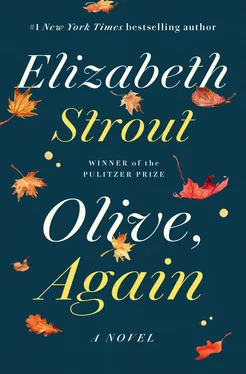“Bernie,” Suzanne said. “First— Now, please listen to me and tell me the truth. Do you know if my father ever had an affair? The woman who works at the Comfort Inn, when I went back to get my bag, she said she recognized my name from the credit card I had paid with, and she said she had always loved my father—she worked at that gas station in Freeport—and she said my mother used to come into that gas station with him at noontime, always so nice with her red hair, but my mother never had red hair.”
There was a silence, then Bernie said, “I’m not going to answer that.”
“Well, I guess you just did.”
“No. I didn’t.” After a moment Bernie added, “You’re a lawyer, and you know that privilege does not end with the death of a client.”
“Okay,” Suzanne said. “But just hold on, okay?”
“I’m right here, Suzanne.” He added, “I’m not going anywhere.” He picked up a paperclip and touched it repeatedly to his desk. He heard her weeping, and then he heard her finally stop.
“Oh, Bernie. I know my father probably had an affair, he probably had a dozen affairs, and I don’t want to be like my father—”
“Suzanne.” Bernie’s voice was firm. He let the paperclip stay on his desk. “You are not like your father. Do you hear me? You have always been you. And you alone.” Then he said, “Where are you right now?”
“At a rest stop on the turnpike. There’s a mother with a little boy and they’re laughing about something and it reminds me of how I used to be with my boys.”
“And they’re still your boys,” Bernie said. “They always will be.”
“But, Bernie, can I tell you one more thing?”
“Of course you can.”
“I stopped to see my mother before I left town, and she told me that Doyle had always been a bad boy, that he—” Suzanne was crying again. “That he—he always wanted her to play with his willie. Oh God, Bernie. Oh Jesus.”
Bernie was silent for quite a while, and then he said quietly, “Oh, Suzanne. I don’t know what to say about that.” He leaned forward, setting a hand to his head as he held the telephone in the other.
“But do you think—oh, Bernie, do you think she ever? Oh God, I work with kids like this! Even my creepy therapist told me that a guy, however nuts he is, doesn’t stab a woman twenty-nine times unless he has a lot of aggression toward a woman. Toward, you know, I guess his mother.”
“I know what you’re saying,” Bernie said. And then after a moment he said, “I guess we’ll never know.”
“No.” And then Suzanne said, “But, Bernie, it makes me so sad for that poor boy! You know, I’m going to visit him more often. I usually go once a month to see him there in Connecticut, but now that the boys are gone and I have more time, I’m going to go much more often. I just am, oh God, Bernie, that poor child!”
“You go as often as you need to,” Bernie said.
When Suzanne spoke next she sounded exhausted. “Bernie, my father was abusing my mother. She had bruises all over her before she went into that home.”
Bernie sat up straight; a kind of jolt went through him. He said quietly, “I thought that might be true.”
“You did? Why did you think it might be true?”
Bernie closed his eyes, then opened them, and said, “It’s not altogether unusual in those circumstances.” Then he said, “We got her into that place ahead of other people.”
“How?” Suzanne asked.
“Your father had money. That’s how.”
“You helped him do that?”
“I did.” Bernie felt himself blush. He was lying to her by not telling her how her mother had called him to say she was in danger. He opened his mouth, then closed it.
“Oh, Bernie. Well, thank you.” She added, “You probably saved her life.”
“I never saved anyone’s life,” Bernie said.
Suzanne said, “Bernie. Bernie. Do you realize what I came from? Do you realize that? Oh my God, those people! How did I get out alive?” Then Suzanne said, “But you did too. You got out as well.” She added, “Except your parents were murdered, and mine were—well, they almost were murder ers , Bernie. And my brother is a murderer. Oh my God .”
Bernie said, “But you got out. Just as you said.”
Suzanne asked, “How did you get out of…where were you born?”
“Hungary.” Bernie spread his hand over his face briefly. He wanted to commend her for everything she had done with her life, to say that she had lived decently by helping those children every day through the AG’s office, and by raising her boys, and by her loyalty to Doyle. But instead he answered her question. “I got out when I was a kid, because my uncle came to America and my parents wanted me to come with him, they said they would join us soon. And then they didn’t.”
“I didn’t know you were born in Hungary. Do you remember your parents at all?”
Bernie glanced around his office before he answered her. It had been a long time since he had spoken of these things to anyone. “Well, I remember my father reading the Torah. I remember my mother setting the table. And I remember her reading to me when I was sick one time and in bed.”
“Oh, Bernie.” Suzanne’s voice sounded stronger now. “Bernie, can I just ask you one last thing?”
“Of course, Suzanne.”
“Do you have any faith? Religious faith, I mean.”
Bernie felt a physical response to this, as though a small wave had just rolled through his chest. He waited and then he said, “You know, I’ve lived for many years as a secular Jew, and I don’t believe I have any faith in that sense.”
“But?” Suzanne asked. “There’s a ‘but’—I can hear it in your voice.”
A tentative earnestness spread through Bernie now. He felt as though he had been called upon to give something of himself that was far outside his purview as a lawyer, and it was something he had never given to anyone, except his wife, vaguely, years ago. “Okay,” he said. “The ‘but’ is this: But do I have faith? I do. The problem is, I can’t describe it. But it’s a faith of sorts. It is a faith.”
“Can you tell me? Oh, please tell me, Bernie.”
Bernie put his hand to the back of his neck. “I can’t, Suzanne. Because I don’t have words to describe it. It’s more an understanding—I’ve had it most of my life—that there is something much larger than we are.” He felt a sense of failure; he had failed in telling this.
Suzanne said, “I used to feel that. For years I would have sensations of just what you described. But I can’t really describe it either.” Bernie did not answer, and Suzanne continued. “When I was a kid, and alone—I spent a lot of time alone, you know, when I wasn’t at school—I would take these walks and I would get this feeling, this very deep sensation, and I understood—only the way a kid could understand these things—that it had something to do with God. But I don’t mean God like some father figure, I don’t even know what I mean—”
“I know what you mean,” Bernie said.
“And I kept having that feeling every so often right into my adult life, I never told anybody, because what was there to tell?”
“I understand that completely,” Bernie said.
“But I haven’t had it for a few years, and so I wonder: Did I make it up? But I know I didn’t, Bernie. I never told my husband, I never told any body. But whenever someone says they’re an atheist, I always privately have this bad reaction, and they give all the obvious reasons, you know, kids get cancer, earthquakes kill people, all that kind of stuff. But when I hear them, I think: But you are barking up the wrong tree.” She added, “But I couldn’t say what the right tree is—or how to bark up it.”
Читать дальше












